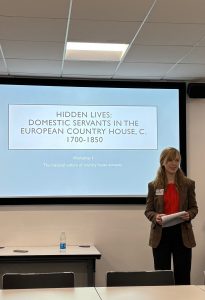Hidden Lives: Domestic servants in the European country house, 1700-1850.
New, international research network on country house servants
 This AHRC-funded network brings together heritage professionals and researchers from a range of disciplines and countries to share research on the lives of servants in country houses across Europe: a surprisingly neglected area that has huge potential to inform the under-standing and presentation of the country house. It comprises a series of four workshops through 2024 and 2025.
This AHRC-funded network brings together heritage professionals and researchers from a range of disciplines and countries to share research on the lives of servants in country houses across Europe: a surprisingly neglected area that has huge potential to inform the under-standing and presentation of the country house. It comprises a series of four workshops through 2024 and 2025.
The network hosted its first workshop on “The material culture of country house servants” at Manchester Metropolitan University (UK) on 23 January. Six of the network’s members shared their research on servants and material culture, each showcasing very rich material.
Economic historian Göran Ulväng (Uppsala University, Sweden) highlighted the huge differences between housekeepers’ and maids’ wages and possessions in Swedish country houses in the eighteenth century. This presentation also sparked a discussion on credit among the audience. Anne Sophie Overkamp (University of Tübingen, Germany) fascinated the audience with rich descriptions of the thick bedding and wealth compiled in duvets in her German country houses.
Elizabeth Jamieson (Attingham Study Programme, University of Oxford, National Trust; UK) shed light on the servants working with horses and transportation – seen through art and material culture. Particularly one picture of a livery coat that had been passed down from footman to footman brought out the people inside the uniforms. Alyssa Myers (Manchester Metropolitan University and English Heritage, UK) emphasized how the lackeys and footmen serving dinner would function almost as décor in the country house, an important part of the dining experience. Kerry Bristoll (Leeds University and National Trust, UK) talked about the Wynn family’s difficulties in hiring and keeping servants for their estate of Nostell in Yorkshire, and their house in St. James’ Square, London. Finally, Jon Stobart (Manchester Metropolitan University) discussed evolving elements of comfort in servants’ possessions over the eighteenth century, prompting us to consider servants’ comfort and privacy, rather than their day jobs.
The network will host four workshops, develop a virtual exhibition, and publish an edited volume, with the aim of building a sustainable community of historians and heritage professionals with a shared interest in country house servants. It is led by Jon Stobart (Manchester Metropolitan University, UK) and Kristine Dyrmann (University of Oxford/ Aarhus University, Denmark).
The next workshop will be held on 4 June 2024. The workshop will focus on representations of country house servants in visual culture and literature. See Call for Papers here: Workshop 2 – CfP